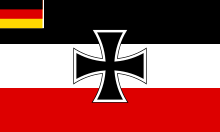
Reichswehr
Combined military forces of Germany 1921–1935 / From Wikipedia, the free encyclopedia
Dear Wikiwand AI, let's keep it short by simply answering these key questions:
Can you list the top facts and stats about Reichswehr?
Summarize this article for a 10 year old
Reichswehr (lit. 'Reich Defence') was the official name of the German armed forces during the Weimar Republic and the first years of the Third Reich. After Germany was defeated in World War I, the Imperial German Army (Deutsches Heer) was dissolved in order to be reshaped into a peacetime army. From it a provisional Reichswehr was formed in March 1919. Under the terms of the Treaty of Versailles, the rebuilt German Army was subject to severe limitations in size, structure and armament. The official formation of the Reichswehr took place on 1 January 1921 after the limitations had been met. The German armed forces kept the name Reichswehr until Adolf Hitler's 1935 proclamation of the "restoration of military sovereignty", at which point it became part of the new Wehrmacht.
| Reichswehr | |
|---|---|
 War ensign of the Reichswehr | |
| Founded | 6 March 1919; 105 years ago (6 March 1919) |
| Disbanded | 16 March 1935; 89 years ago (16 March 1935) |
| Service branches |
|
| Headquarters | Zossen, Brandenburg |
| Leadership | |
| Commander-in-chief | Friedrich Ebert (1919–25) Paul von Hindenburg (1925–34) Adolf Hitler (1934–35) |
| Reichswehr Minister | See list |
| Chief of the ministerial office | See list |
| Personnel | |
| Military age | 18–45 |
| Conscription | No |
| Active personnel | 115,000 (1921) |
| Related articles | |
| History | German Revolution Greater Poland uprising Silesian Uprisings Ruhr uprising |
| Ranks | Military ranks of the Reichswehr |
Although ostensibly apolitical, the Reichswehr acted as a state within a state, and its leadership was an important political power factor in the Weimar Republic. The Reichswehr sometimes supported the democratic government, as it did in the Ebert-Groener Pact when it pledged its loyalty to the Republic, and sometimes backed anti-democratic forces through such means as the Black Reichswehr, the illegal paramilitary groups it sponsored in contravention of the Versailles Treaty. The Reichswehr saw itself as a cadre army that would preserve the expertise of the old imperial military and form the basis for German rearmament.